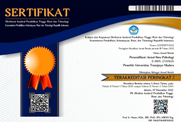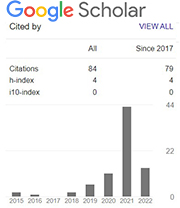How Does Grit Relate to The Psychological Well-being of Students Who Are Writing Thesis?
Abstract
Keywords
Full Text:
PDFReferences
Ambarwati, P. D., Pinilih, S. S., & Astuti, R. T. (2019). Gambaran tingkat stres mahasiswa. Jurnal Keperawatan Jiwa, 5(1), 40. https://doi.org/10.26714/jkj.5.1.2017.40-47
Bordbar, F. T., Nikkar, M., Yazdani, F., & Alipoor, A. (2011). Comparing the psychological well-being level of the students of Shiraz Payame Noor University in view of demographic and academic performance variables. Procedia - Social and Behavioral Sciences, 29, 663–669. https://doi.org/10.1016/j.sbspro.2011.11.290
Christopoulou, M., Lakioti, A., Pezirkianidis, C., Karakasidou, E., & Stalikas, A. (2018). The Role of Grit in Education: A Systematic Review. Psychology, 09(15), 2951–2971. https://doi.org/10.4236/psych.2018.915171
Credé, M., Tynan, M. C., & Harms, P. D. (2017). Much ado about grit: A meta-analytic synthesis of the grit literature. Journal of Personality and Social Psychology, 113(3), 492–511. https://doi.org/10.1037/pspp0000102
Duckworth, A. L. (2020). Grit: Kekuatan Passion Kegigihan. Gramedia.
Duckworth, A. L., Peterson, C., Matthews, M. D., & Kelly, D. R. (2007). Grit: Perseverance and passion for long-term goals. Journal of Personality and Social Psychology, 92(6), 1087–1101. https://doi.org/10.1037/0022-3514.92.6.1087
Duckworth, A. L., & Quinn, P. D. (2009). Development and Validation of the Short Grit Scale (Grit–S). Journal of Personality Assessment, 91(2), 166–174. https://doi.org/10.1080/00223890802634290
Evans, D., & Greenway, C. (2017). Exploring the psychological wellbeing of students in Higher Education. Retrieved April, 19.
Huo, J. (2022). The Role of Learners’ Psychological Well-Being and Academic Engagement on Their Grit. Frontiers in Psychology, 13. https://doi.org/10.3389/fpsyg.2022.848325
Husky, M. M., Kovess-Masfety, V., & Swendsen, J. D. (2020). Stress and anxiety among university students in France during Covid-19 mandatory confinement. Comprehensive Psychiatry, 102, 152191. https://doi.org/10.1016/j.comppsych.2020.152191
Jambi, A. S. (2023). Jambi Geger! Mahasiswa Unja Ditemukan Tewas Gantung Diri di Kamar Kos. SINDOnews.
Jin, B., & Kim, J. (2017). Grit, Basic Needs Satisfaction, and Subjective Well-Being. Journal of Individual Differences, 38(1), 29–35. https://doi.org/10.1027/1614-0001/a000219
Kurniasari, E., Rusmana, N., & Budiman, N. (2019). Gambaran Umum Kesejahteraan Psikologis Mahasiswa Universitas Pendidikan Indonesia. Journal of Innovative Counseling : Theory, Practice & Research, 3(2), 52–58. http://journal.umtas.ac.id/index.php/innovative_counseling
Liu, C. H., Pinder-Amaker, S., Hahm, H. “Chris,” & Chen, J. A. (2022). Priorities for addressing the impact of the COVID-19 pandemic on college student mental health. Journal of American College Health, 70(5), 1356–1358. https://doi.org/10.1080/07448481.2020.1803882
Pramitha, R., & Astuti, Y. D. (2021). Hubungan Kesejahteraan Psikologis dengan Kesepian pada Mahasiswa yang Merantau di Yogyakarta. Jurnal Sosial Teknologi, 1(10). https://doi.org/10.36418/jurnalsostech.v1i10.211
Priyohadi, N. D., Suhariadi, F., & Fajrianthi, F. (2019). Validity Test for Short Grit Scale (Grit - S) Duckworth on Indonesian Millennials. Journal of Educational, Health and Community Psychology, 8(3), 375. https://doi.org/10.12928/jehcp.v8i3.13870
Rachmayani, D., & Ramdhani, N. (2014). Adaptasi Bahasa dan Budaya Skala Psychological Well Being. Conference: Seminar Nasional Psikometri.
Rahmadani, N. A., Amin, S., & Safarina, N. A. (2023). Kesejahteraan Psikologis Mahasiswa yang sedang Menyelesaikan Skripsi ditinjau dari Tipe Kepribadian. Insight: Jurnal Penelitian Psikologi, 1(1).
Rosyadi, A. K., & Laksmiwati, H. (2018). Hubungan grit dan subjective well-being mahasiswa psikologi universitas negeri Surabaya angkatan 2017. Character : Jurnal Penelitian Psikologi, 5(2), 1–6. https://ejournal.unesa.ac.id/index.php/character/article/view/23542
Ryff, C. D. (2014). Psychological Well-Being Revisited: Advances in the Science and Practice of Eudaimonia. Psychotherapy and Psychosomatics, 83(1), 10–28. https://doi.org/10.1159/000353263
Ryff, C. D., & Keyes, C. L. M. (1995). The structure of psychological well-being revisited. Journal of Personality and Social Psychology, 69(4), 719–727. https://doi.org/10.1037/0022-3514.69.4.719
Ryff, C. D., & Singer, B. H. (2008). Know Thyself and Become What You Are: A Eudaimonic Approach to Psychological Well-Being. Journal of Happiness Studies, 9(1), 13–39. https://doi.org/10.1007/s10902-006-9019-0
San Juan, F. M. Z., & Bance, L. O. (2019). Development of Intervention Program based on Grit and Psychological Well-Being to Alleviate Acculturative Stress among Foreign Students. IAFOR Journal of Psychology & the Behavioral Sciences, 5(1), 55–70. https://doi.org/10.22492/ijpbs.5.1.05
Septania, S., Ishar, M., & Sulastri, S. (2018). Pengaruh Grit Terhadap Prokrastinasi Akademik Mahasiswa Fakultas Psikologi Universitas Muhammadiyah Lampung. Seminar Nasional Psikologi.
Shah, R., & Deshpande, A. (2022). Relationship between Psychological Well-being, Resilience, Grit, and Optimism among College Students in Mumbai. Journal of Psychosocial Research, 17(1), 43–54. https://doi.org/10.32381/JPR.2022.17.01.5
Takiuddin, T., & Husnu, M. (2021). GRIT DALAM PENDIDIKAN. JKP (Jurnal Konseling Pendidikan), 4(2), 52–58. https://doi.org/10.29408/jkp.v4i2.3081
Triaswari, P., & Utami, S. M. (2014). Kesejahteraan psikologis mahasiswa ditinjau dari stres. Universitas Gadjah Mada.
Vainio, M. M., & Daukantaitė, D. (2016). Grit and Different Aspects of Well-Being: Direct and Indirect Relationships via Sense of Coherence and Authenticity. Journal of Happiness Studies, 17(5), 2119–2147. https://doi.org/10.1007/s10902-015-9688-7
Vinothkumar, M., & Prasad, N. (2016). Moderating role of resilience in the relationship between grit and psychological well-being. International Journal of Psychology and Psychiatry, 4(2), 10. https://doi.org/10.5958/2320-6233.2016.00009.2
von Keyserlingk, L., Yamaguchi‐Pedroza, K., Arum, R., & Eccles, J. S. (2022). Stress of university students before and after campus closure in response to COVID‐19. Journal of Community Psychology, 50(1), 285–301. https://doi.org/10.1002/jcop.22561
Wawan, J. H. (2020). Diduga Stres Skripsi, Mahasiswa Yogya Tewas Bunuh Diri dalam Kos Baca artikel detiknews, “Diduga Stres Skripsi, Mahasiswa Yogya Tewas Bunuh Diri dalam Kos” selengkapnya https://news.detik.com/berita-jawa-tengah/d-4880262/diduga-stres-skripsi-mahasiswa-yogya-tewas-bunuh-diri-dalam-kos.
DOI: https://doi.org/10.21107/personifikasi.v16i1.25342
Refbacks
- There are currently no refbacks.
Copyright (c) 2025 Farah Shiddiqoh, Komarudin -

This work is licensed under a Creative Commons Attribution 4.0 International License.


Personifikasi by Universitas Trunojoyo Madura is licensed under a Creative Commons Attribution 4.0 International License.










